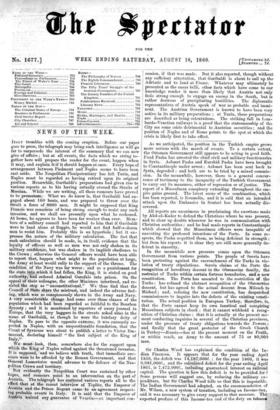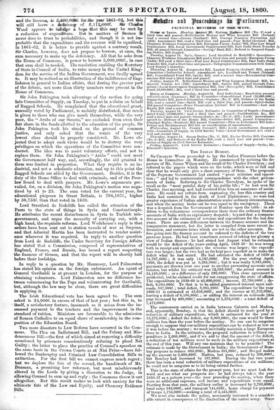_ Sir Charles Wood has explained the condition of the
In- dian Finances. It appears that for the year ending April 1859, the deficit was 14,187,0001. ; for the year 1860, it was 9,981,000/., and the calculated deficit for the year ending April 1861; is 7,472,000/., including guaranteed interest on railroad capital. The question is how this deficit is to be provided for ? Some persons will suggest one, by reducing the military ex- penditure, but Sir Charles Wood tells us that this is impossible. The Indian Government had adopted, on the recommendation of Mr. Wilson, a new system of taxation, including an Income-tax, atid it was necessary to give every support to that measure. ThaWk 4 exported produce of this Income-tax and of the duty on tob
and the licence, us 3,,:60.0,00el. for Idie x kb61-624 but this will still leave .a ,defieienc, of 8,111100K r Chatles
Wood appears to indike 6 hop that this me be =et iby a reduction of .expenditure. But in matters of finance dt never does to trust to probabilities, and though it is not im- probable that the expenditure and the revenue will be equalized, in 1861-62, it is better to provide against a contrary result. Sir Charles, however, does not propose to borrow, at once, the sum necessary to make up the deficiency. All that he asks from the House of Commons, is power to borrow 3,000,000/., in case that sum shall be needed. The resolution enabling the Secretary of State in Council of India, to raise money in the 'United King- dom for the service of the Indian Government, was finally agreed to. It may be noticed as an illustration of the indifference of Eng- lishmen in general to Indian affairs, that during the greater part of the debate, not more than thirty members were present in the House of Commons.
Sir John Pakington took advantage of the motion for going into Committee of Supply, on Tuesday, to put in a claim on behalf of Ragged Schools. He complained that the educational grant, annually voted by Parliament, is unfairly distributed, that much is given to those who can give much themselves, while the very poor, the "Arabs of our Streets," are excluded from even their fair share in the funds allotted to the education of the people, Sir John Pakington took his stand on the ground of common justice, and only asked that the wants of the very lowest class should be properly considered. Mr. Lowe ob- jected that to adopt such views would be to destroy the very privileges on which the operations of the Committee were con- ducted. The idea was to assist voluntary efforts, and not to replace them. Sir John Pakington's " Arabs " could not meet the Government half way, and, accordingly, the aid granted to them was limited in proportion. What they require is an in- dustrial, and not a scholastic education, and up to this point the Ragged Schools are aided by the Government. Besides, it is the duty of the Home Office to deal with criminals, and of the Poor- law Board to deal with paupers. Mr. Lowe's arguments pre- vailed, for, on a division, Sir John Pakington's motion was nega- tived by 41 to 25. The sum voted for the current year, for educational purposes in Great Britain, is 798,167/., higher by 38,753/. than that voted in 1859.
Lord Stratford de Redcliffe has called the attention of the Peers to the state of things in Syria and Constantinople. He attributes the recent disturbances in Syria to Turkish mis- government, and urges the necessity of carrying out, with a high hand, the requisite reforms. Lord Wodehouse's reply is that orders have been sent out to station vessels of war at Smyrna, and that Admiral Martin has been instructed to render assist- ance wherever it was required. In reply to another question from Lord de Redcliffe, the Under Secretary for Foreign Affairs has stated that a Commission, composed of representatives of England, France, and Russia, has issued a report respecting the finances of Greece, and that the report will be shortly laid before their lordships.
In reply to a question by Mr. Hennessy, Lord Palmerston has stated his opinion on the foreign enlistment. An agent of General Garibaldi is at present in London, for the purpose of obtaining volunteers.. Lord Palmerston sees no difference be- tween volunteering for the Pope and volunteering for Garibaldi, but, although the law may be clear, there are great difficulties in applying it.
The Irish Educational vote has been agreed to. The sum asked is 24,000/. in excess of that of last year ; but this is, in - itself, a satisfactory feature, inasmuch as it arises from the in- creased payment to the teachers and the improvement in the standard of tuition. Ministers are favourable to the admission of Roman Catholics to an equal share of membership in the com- position of the Education Board.
Two more disasters to Law Reform have occurred in the Com- mons. The Plea on Indictment Bill, and the Felony and Mis- demeanour Bill—the first of which aimed at removing a difficulty occasioned by prisoners conscientiously refusing to plead Not Guilty ; the latter to place the practice of Counsel's speeches on the same basis in the Crown Courts as at Nisi Prins—have fol- lowed the Bankruptcy and Criminal Law Consolidation Bills to extinction. For the first bill we cannot express much regret ; bet we deplore the fate of the second, the handiwork of Mr. Denman, a promising law reformer, but most mischievously altered in the Lords by giving a discretion to the Judge, in allowing Counsel to sum up and reply ; the Commons threw it out altogether. But this result makes us look with anxiety for the ultimate fate of the Law and Equity, and Chancery Evidence Bills.



























 Previous page
Previous page